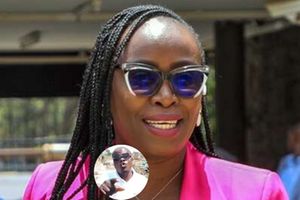Let’s unlearn and normalise discussions about the vagina

Pelvic organ prolapse is the displacement of organs within the pelvic cavity into the vagina.Let’s normalise discussions about the vagina. Sexual education should not just be about reproduction and contraception
What you need to know:
- The profiteers of this silence are crafty individuals and corporations who prey on women's insecurities.
- By keeping women ashamed and silent about their vaginas, these entities continue to make enormous profits.
How do you say vagina in your mother tongue? It can be an embarrassing question, and I bet there’s a euphemism for it in your language. Growing up, I was too ashamed to ask. Now that I’m a grown woman, I still don’t feel equipped with the vocabulary and “shamelessness” to have such a discussion with my elders.
It’s taken a lot of unlearning to get rid of my instinct to treat this single part of the female with the shame and silence forced by patriarchal norms.
Eve Ensler, the author of the wildly popular book The Vagina Monologues, compared this secrecy to the Bermuda Triangle, an urban legend focused on a loosely defined region in the western part of the North Atlantic Ocean where several aircraft and ships are said to have disappeared under mysterious circumstances.
Discussing vaginas goes beyond simply acknowledging their existence, though this is a great first step. It’s also about broader discussions about reproductive health, sexual pleasure and body autonomy. This silence perpetuates unfounded myths, from age-old notions about virginity to taboos around female pleasure.
Centuries of oppression have stifled women's autonomy over their own bodies. We were taught to cloak anything related to our vaginas in shame, leaving us ill-equipped to understand ourselves and make informed choices about our sexual health. If we don’t talk about vaginas openly and thoroughly, then harmful narratives about this precious body part will carry the day.
Without open dialogue, harmful narratives flourish. A prime example is the trending controversy surrounding Yoni Pearls – touted on social media as a "natural" vaginal detox. Users claim newfound "freshness" after using them, a reflection of how women internalise negative perceptions of their bodies. This plays into the hands of unscrupulous marketers peddling cleansing, purification, and tightening solutions.
The profiteers of this silence are crafty individuals and corporations who prey on women's insecurities. From the beauty industry selling products to "fix" supposed imperfections to the marketing of products that promise to make vaginas smell "cleaner" or "fresher," they prey on women's fears and discomfort. By keeping women ashamed and silent about their vaginas, these entities continue to make enormous profits.
The Pharmacy and Poisons Board in Kenya issued a statement warning the public that "Yoni Pearls" is neither registered nor authorised for use in Kenya as required by the Pharmacy and Poisons Act, adding that its usage poses potential public health risks as the board cannot guarantee their quality, safety or efficacy. Such declarations, while essential, don’t really protect women.
Let’s normalise discussions about the vagina. Sexual education should not just be about reproduction and contraception but should encompass a comprehensive understanding of the female body and pleasure. It’s the surest way we can defeat the profiteers of the shame and silence about the vagina.
Miss Oneya comments on social and gender topics (Twitter @FaithOneya; [email protected]).





